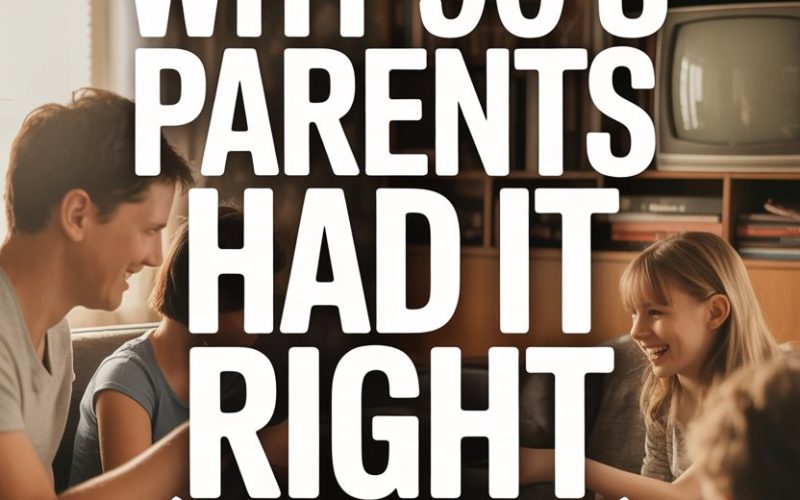Ah, the 1990s. A time when phones had cords, playgrounds were paved with less-than-forgiving substances, and the only thing streaming was your mum trying to get you out the door.
For parents today, the 90’s can feel like a distant planet—one with fewer “screen time” battles and a suspicious lack of anti-bacterial wipes.
Yet, in the chaos and clutter, those parents got plenty of things surprisingly right.
Confidence in Letting Kids Roam
Once upon a time, being told to “go play outside” was a universal directive. The 90’s philosophy: if the sun was up, you belonged outdoors, resurfacing only for meals or the threat of homework.
Kids found adventure in empty lots, back gardens, and the nearest stick.
That freedom fostered independence. According to a University of Michigan study on children’s autonomy, children given age-appropriate responsibility and space to explore grew into more confident problem-solvers.
Tonight, if the weather allows, suggest an hour in the back yard or organise a little park meet-up with minimal micromanaging. Let your child lead the play, even if it means an impressive mud collection.
No One Knew Your Business
If you fell off your bike in 1996, you either brushed yourself off or told your mum. You didn’t post a “#braveboy” photo on Instagram or seek validation from strangers.
Privacy wasn’t a buzzword; it was just life.
Modern parents operate in a goldfish bowl, surrounded by curated feeds and comment sections. Sure, connecting with others is great, but sometimes it’s helpful to step back from the chorus of opinions.
Next time you’re feeling judged about lunchboxes or screen time, picture a 90’s parent rolling their eyes and carrying on, blissfully unaware of how many strangers cared about sandwich cut shapes.
Embracing Boredom as a Feature, Not a Bug
Remember boredom? That yawning chasm between after-school cartoons and dinner? 90’s parents were champions of “figure it out.” No Pinterest crafts prepped, no apps queued up.
Turns out, boredom is brilliant for creativity. Psychologists at the University of Central Lancashire found that children left to their own devices (the non-electronic kind) are more inventive and resourceful.
If you hear the whine of “I’m bored,” resist the urge to fill the void. Let them be bored.
Give yourself permission to finish your coffee while they stare at the ceiling and hatch a wild plan involving sofa cushions and a cardboard box.
Screen Time—Without the Existential Crisis
Television existed, certainly. But with limited channels, scheduled shows, and the agony of missing your favourite because Mum needed the phone line, screens weren’t the all-consuming vortex they are today.
90’s parents didn’t tussle with blue light filters or app-based time management. The TV was just another tool, not a battleground. Try reclaiming a bit of that energy.
Consider a set window for screens—maybe after chores or before dinner. Make it feel like a treat, not a tablet-based life sentence.
And if the kids moan, threaten them with a VHS tape and a dodgy tracking line.
Birthday Parties That Didn’t Need a Loan
90’s birthday parties featured pass-the-parcel, supermarket cake, and party bags filled with lollies and plastic tat. No bouncy castle? No problem.
Parents supervised, snapped embarrassing photos, and called it a day.
It’s easy to get swept up in the birthday-industrial complex. Next time, borrow a 90’s move: a simple picnic at the park, musical chairs, and a slab of fairy bread.
Kids remember the games, not the price tag on the decorations.
Simple, Unplugged Family Time
Gathering around the telly for “The Simpsons” or spending hours with a puzzle—family time in the 90’s was delightfully low-key. No elaborate outings required, no frantic scheduling of “enrichment activities.”
Modern life is hectic, but little routines can work wonders. Pick a weekly “retro night”—board games, popcorn, and as many dad jokes as your kids can tolerate.
These moments stick, even if the Monopoly board ends up in mediation.
Trusting Kids to Sort Themselves Out (a Bit)
Siblings fought, friends squabbled, and parents rarely intervened unless blood or broken furniture was involved. Conflict resolution was an 80’s and 90’s superpower.
Experts at Harvard’s Center on the Developing Child highlight the value of letting children negotiate, compromise, and occasionally storm off in a huff.
Next time you hear raised voices over LEGO, wait before stepping in. Kids learn to manage conflict by…well, managing conflict.
Parenting Without an Instruction Manual (and Fewer Acronyms)
Attachment parenting? Gentle parenting? 90’s parents had “do your best and cross your fingers.” There were no viral debates over sleep training techniques or snack philosophies.
It’s fine to seek advice—goodness knows, Google is tempting at 3am. Just don’t forget that there’s no single “right” way to do this.
If your gut tells you the kids can eat fish fingers one more night this week, you’re probably onto something.
Allowing Kids to Fail (and Try Again)
Participation trophies weren’t standard issue. You lost races. You forgot your lunch. You missed the bus. The lesson: life isn’t always fair, but you’ll probably survive.
Psychologists such as Angela Duckworth, author of “Grit”, argue that resilience grows from small setbacks. If your child forgets their PE kit, don’t rush to drop it off.
Let them navigate a bit of discomfort and learn from it. That’s proper 90’s resilience training.
Low-Key Nutrition (Yes, Even Frozen Fish Fingers)
Lunchboxes were not curated for Instagram. Cheese sandwiches, a bruised apple, and maybe a Penguin bar—nutrition wasn’t a competitive sport. No one was tracking macros or negotiating with food influencers.
If dinner tonight is beans on toast or fish fingers with a side of “close enough,” you’re in excellent company. Kids fed, everyone survived, and the nation’s collective cholesterol stayed intact.
The Power of “See You When the Streetlights Come On”
Evenings spent outside, with only the fading light as your curfew, meant trusting kids to judge the clock and exercise a bit of responsibility. That phrase—“home when the streetlights come on”—became a contract between parent and child.
With a bit of adaptation, this still works. Set a clear boundary: “Be back when the timer goes off” or “Check in every hour.”
Kids gain trust, you get a little peace and quiet, and the house doesn’t sound like a stampede of elephants for at least half an hour.
Why the 90’s Playbook Still Works
Today’s parents juggle more information, more judgment, and a faster pace than ever. Yet the essential job—raising kind, resilient, happy humans—hasn’t changed.
Sometimes, the best strategy isn’t a shiny new app, a colour-coded chart, or an expert webinar. Sometimes it’s giving yourself a break, rolling with the mess, and remembering that the basics are pretty brilliant.
Next time you’re feeling overwhelmed by parenting “shoulds,” channel a 90’s parent. Trust your instincts. Laugh at the chaos.
And remember—you’re doing better than you think. Even if no one’s offered you a Penguin bar lately.




